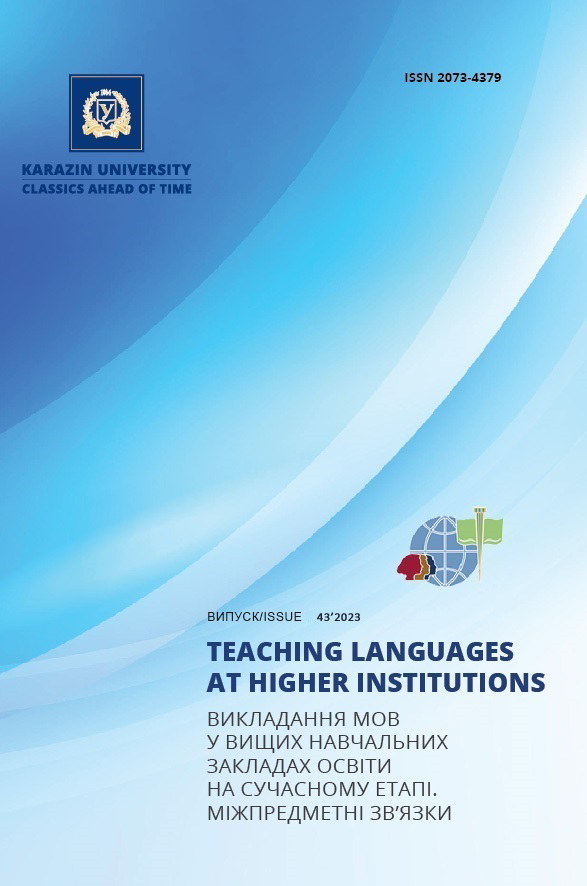Ukrainian as a foreign language: principles of the development of academic integrity and critical thinking among foreign students
Abstract
The scholarly and practical interest both within Ukraine and globally towards theoretical exploration, practical methodologies, and technologies fostering critical thinking and exemplifying academic integrity across the European and international landscape aligns with the imperative of advancing higher education within a framework of innovative student development. This article aims to investigate the impact of instructors teaching Ukrainian as a foreign language on the cultivation and enhancement of critical thinking skills and academic integrity among international students.
The research methodology is rooted in R. Paul and L. Elder’s theory, emphasizing a dual-component structure of critical thinking encompassing elements of thinking and intellectual standards. The approach integrates our own professional reflections, insights from colleagues, data collection, student questionnaires, and scientific observations of their academic.
This study clarifies the principles underlying the introduction of optimal tools from the arsenal of philological disciplines. These tools are designed to nurture critical thinking skills and instill adherence to academic integrity principles among foreign students at Kyiv National University of Technologies and Design, particularly within the framework of the elective course “Interesting Ukrainian: Conversation Club”. Additionally, it analyzes quantitative indicators reflecting the acquisition of critical thinking skills and adherence to academic integrity among foreign students.
The findings affirm several key points: Firstly, instructors wield significant influence in raising foreign students’ awareness of the importance of upholding academic integrity ideals. Secondly, teachers possess the capacity to structure educational modules effectively, fostering the development of critical thinking skills within their disciplines. Thirdly, this approach stimulates foreign students to perceive themselves as integral contributors to the educational process, nurturing their sense of responsibility and professional awareness. Finally, the study highlights the most effective methods for cultivating academic integrity.
Downloads
References
Dvorianchykova, S., Yuhan, N. (2018). Teaching critical thinking in Ukrainian high school: educational trends and challenges of implementation. Scientific Letters of Academic Society of Michal Baludansky, 6 (2A), pp. 51–56 [in Ukrainian].
Code of academic integrity of the Kyiv National University of Technologies and Design. (2021). Kyiv National University of Technologies and Design. Available at: https://knutd.edu.ua/files/dostupdopi/kodeks_akadem_dobrochesnosti_knutd_15.09.2021.pdf [Accessed 01 Mar. 2023] [in Ukrainian].
On education. Law of Ukraine No 2145-VIII of September 5, 2017. Available at: https://zakon.rada.gov.ua/laws/show/2145-19?lang=uk#Text [Accessed 02 Mar. 2023] [in Ukrainian].
Course syllabus “Interesting Ukrainian: speaking club. Part 1”. (2021). Kyiv National University of Technologies and Design. Available at: https://knutd.edu.ua/files/ekts/kdvvzvo/2023-2024/61_CUR_1_2021_FP.pdf [Accessed 01 Mar. 2023] [in Ukrainian].
Course syllabus “Interesting Ukrainian: speaking club. Part 2”. (2021). Kyiv National University of Technologies and Design. Available at: https://knutd.edu.ua/files/ekts/kdvvzvo/2023-2024/61_CUR_2_2021_FP.pdf [Accessed 01 Mar. 2023] [in Ukrainian].
Kharchenko, N. (2018). Rozvytok krytychnoho myslennia. Innovatsiini formy roboty dlia ditei i doroslykh [Development of critical thinking. Innovative forms of work for children and adults]. Kyiv: School world [in Ukrainian].
Yuhan, N., Dvorianchykova, S. (2019). Forming competence on “critical thinking” of Ukrainian students. Innovative university and leadership: project and micro-projects, III. Warsaw: Faculty of “Artes Liberales” University of Warsaw, pp. 345–354 [in Ukrainian].
Academic integrity. (2023). The Writing Center of The University of North Carolina at Chapel Hill. Available at: http://surl.li/eihur [Accessed 01 Mar. 2023].
Bloom, B.S. (1956). Taxonomy of Educational Objectives. Handbook: The Cognitive Domain. David McKay, New York.
Bretag, T. (2018). Academic Integrity. Oxford Research Encyclopedia of Business and Management. DOI: https://doi.org/10.1093/acrefore/9780190224851.013.147.
Introduction to ideas to action at University of Louisville. (2023). University of Louisville, Delphi Center. Available at: https://louisville.edu/ideastoaction/about [Accessed 01 Mar. 2023].
Paul, R., Elder, L. (2020). The Miniature guide to critical thinking concepts and tools. Dillon Beach: Foundation for Critical Thinking Press.
Scriven, M., Paul, R. (2019). Defining critical thinking. The Foundation for Critical Thinking. Available at: www.criticalthinking.org/pages/defining-critical-thinking/766 [Accessed 01 Mar. 2023].
Starkey, L. (2004). Critical thinking skills success in 20 minutes а day. N. Y.
The 43rd Annual International Conference on Critical Thinking. (2023). The Foundation for Critical Thinking. Available at: https://www.criticalthinking.org/pages/43rd-critical-thinking-conference-main/1571/ [Accessed 01 Mar. 2023].
The Critical Thinking Institute. (2023). Available at: https://www.thectinstitute.com/ [Accessed 01 Mar. 2023].
The Critical Thinking Summer Institute. (2023). UCLA Summer Sessions. Available at: http://surl.li/eihqm [Accessed 01 Mar. 2023].
The Institute of Critical Thinking at the University of the West Indies. (2023). The University of the West Indies St. Augustine. Available at: https://sta.uwi.edu/ct/ [Accessed 01 Mar. 2023].
These are the top 10 job skills of tomorrow – and how long it takes to learn them. (2020). World economic forum. Available at: https://www.weforum.org/agenda/2020/10/top-10-work-skills-of-tomorrow-how-long-it-takes-to-learn-them/ [Accessed 01 Mar. 2023].
What is Critical Thinking? (2023). University of Louisville, Delphi Center. Available at: https://louisville.edu/ideastoaction/about/criticalthinking/what [Accessed 01 Mar. 2023].
2021 WISE Summit. (2021). World Innovation Summit for Education – WISE. Available at: https://www.wise-qatar.org/wise-2021/ [Accessed 01 Mar. 2023].

